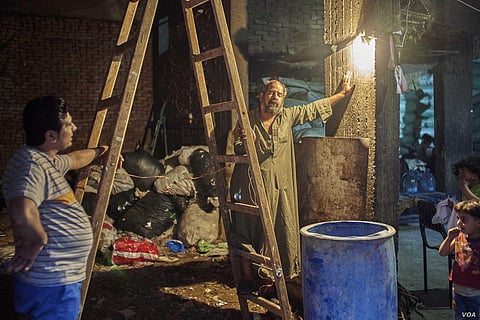
- Home
- न्यूजग्राम
- NewsGram USA
- India
- World
- Politics
- Entertainment
- Culture
- Lifestyle
- Economy
- Sports
- Sp. Coverage
- Misc.
- NewsGram Exclusive
- Jobs / Internships

In 2014, massive blackouts brought much of Egypt to a standstill and called attention to an outdated power grid dating to the 1950s when the Soviet Union supplied much of the technology. Now, Egypt is again turning to Moscow – and to Beijing – as it embarks on a huge drive to modernize its electricity infrastructure.
Egypt has been building new electrical plants in order to avoid serious power cuts and brownouts that crimp industrial production and make life difficult for ordinary citizens. Analysts say electricity demand is growing by five to seven percent a year, along with the population.
Energy and Electricity Minister Mohammed Shaker said Egypt was compelled to step up its electricity production after blackouts and power shortages during the summer of 2014.
Power outages sometimes bring trains to a standstill, causing passengers to force open train doors and walk along the rails to the next station. VOA
He said that the experience was a catalyst to diversifying sources of power production, which traditionally relied on oil and gas for power production for about 90% of the country's power needs. Now, he said, Egypt is starting to move to solar, wind and nuclear power to generate electricity.
Egyptian media reports the government is building the world's largest solar energy power station at Benban, with a capacity of 1,465 megawatts.
Egypt is also producing more electricity with a large wind farm along the coast of the Red Sea. The initial phase of the project has 120 turbines operating and is slated to increase to 300 by 2022. Experts at the plant tell Egyptian TV the region has strong and reliable winds.
A rigged electricity meter in a Cairo apartment building shows how residents sometimes resort to stealing to save money on electric bills. (H. Elrasam/VOA)
He said that Egypt's Gulf of Suez, along with the Gulf of Mexico, are two of the best regions in the world for wind speed, and the wind is stable throughout the year, without disruptions.
Nuclear power in Egypt dates back to cooperation with the former Soviet Union in the 1950s. Egyptian President Abdel Fattah el Sissi signed an agreement with Russian President Vladimir Putin in 2018 to develop the Dabaa Nuclear Power Plant in Marsa Matruoh.
President Sissi said despite turmoil in the region, Egypt has chosen the correct path and is working to build and develop the country. Electricity, he said, is critical for this process and it must not be an obstacle to the building process.
A Cairo apartment building is dotted with outdoor condenser units. For those who can afford the electricity, air conditioning is not a luxury but a necessity. (H. Elrasam/VOA)
Some experts, like Dr. Paul Sullivan at Georgetown University are concerned nuclear power will make Egypt and other countries in the region increasingly reliant on Russia, and even China, for their power needs.
"The Russians have made an agreement with Egypt to upfront 85% of the cost of the power plants in Dabaa. There will be four of them; about 1.2 gigawatts, each. Total costs will be about $28 to $35 billion … and the rest is going to be paid for by Egypt in installments. That gives Russia a lot of leverage," he said.
Sullivan points out that Russian influence "could easily last up to 100 years," given the period required to build the plant, run it for its expected 60 year life-span, and to decommission it, afterwards. He notes the United States has in recent years been unable or unwilling to lend money for such projects, both in Egypt and elsewhere in Africa, leaving the door open to Russian and Chinese political expansion.
The introduction in recent years of lower-consumption LED bulbs mean many Cairo residents, like patrons and this street café, can continue to enjoy bright lights on a summer's eve. (H. Elrasam/VOA)
The former head of Egypt's Nuclear Energy Association, Ali Islam, tells Egyptian TV nuclear power is extremely useful for Egypt in diversifying its power sources.
Nuclear power is clean and non-polluting and is economical in the long term, since a nuclear power plant has a lifespan of 60 years.
Given Egypt's rapidly increasing population, the country needs to invest heavily in infrastructure. Power cuts during Egypt's recent history of political turmoil also points up the strategic importance of reliable energy sources. (VOA)
